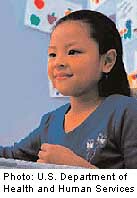Two Languages Better Than One for Kids' Brains: StudyBilingual children excel at problem-solving, creative thinking, research suggests.
THURSDAY, Aug. 9 (HealthDay News) -- Children who speak more than one language seem to have a learning advantage: Being bilingual can improve children's problem-solving skills and creative thinking, a new study suggests. The mental sharpness needed to switch between two languages may develop skills that boost other types of thinking, explained researchers from the University of Strathclyde in Glasgow, Scotland. "Bilingualism is now largely seen as being beneficial to children but there remains a view that it can be confusing, and so potentially detrimental to them," study leader Fraser Lauchlan, a lecturer at the University of Strathclyde's School of Psychological Sciences & Health, said in a university news release. "Our study has found that it can have demonstrable benefits, not only in language but in arithmetic, problem-solving and enabling children to think creatively." The study involved 121 children roughly 9 years old in Scotland and Sardinia who spoke English or Italian. Of these children, 62 were bilingual and also spoke Gaelic or Sardinian. The children were given set tasks in English or Italian. Specifically, they were asked to reproduce patterns of colored blocks, orally repeat a series of numbers, define words and solve mental math problems. The bilingual children performed much better on the tasks than those who spoke only one language, the investigators found. "We also assessed the children's vocabulary, not so much for their knowledge of words as their understanding of them. Again, there was a marked difference in the level of detail and richness in description from the bilingual pupils," said Lauchlan, who is also a visiting professor at the University of Cagliari in Sardinia. "We also found they had an aptitude for selective attention -- the ability to identify and focus on information which is important, while filtering out what is not -- which could come from the 'code-switching' of thinking in two different languages," Lauchlan added. The study authors pointed out that the bilingual children who spoke Gaelic performed better than those who spoke Sardinian. They suggested the Gaelic-speaking children may have benefitted from the formal teaching of the language and its extensive literature. In contrast, Sardinian has a largely oral tradition with no standardized form of the language. The study was released online in advance of print publication in the International Journal of Bilingualism. More information The U.S. National Institutes of Health provides more information on bilingual effects in the brain. (SOURCE: University of Strathclyde, news release, Aug. 3, 2012) Copyright © 2012
HealthDay. HealthDayNews articles are derived from various sources and do not reflect federal policy. healthfinder.gov does not endorse opinions, products, or services that may appear in news stories. For more information on health topics in the news, visit Health News on healthfinder.gov. |